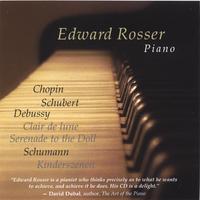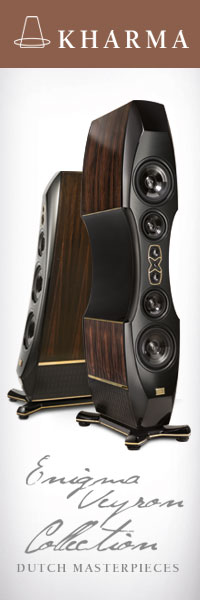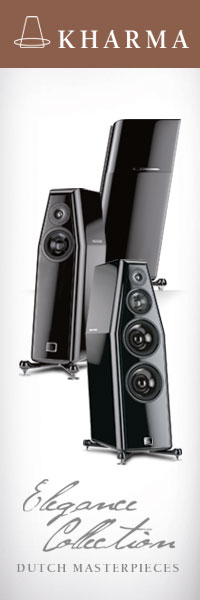Edward Rosser: Piano Music of Chopin, Schubert, Debussy and Schumann
|
Edward Rosser: Piano Music of Chopin, Schubert, Debussy and Schumann |
| [Chetros CD 0805] |
July 2005
 This CD has been challenging and surprising, at first one of the most seemingly naïve and idiosyncratic performances I can recall and then, after repeated auditions, one of the most beautiful. There are, of course, performances that are superb from the outset and only increase in profundity over time. Edward Rosser’s playing, however, hardly had this effect on me. Indeed, I found myself wondering just what he was up to. This was playing quite unlike any I had ever heard. It seemed overly simple, almost constrained away from anything that might smack of virtuosity. I simply didn’t know what to make of it, especially considering what Mr Rosser wrote in a letter that accompanied the disc: “[W]hen I was 21, I decided to change my technique―which was terribly stiff―and began studying the Vengerova technique with Anthony di Bonaventura. What I didn’t know at the time was that it would take over 20 years to fully adapt to this new technique. Which means that, in all the years when most pianists are making a career, I was working on my technique. I am so glad I did!”
This CD has been challenging and surprising, at first one of the most seemingly naïve and idiosyncratic performances I can recall and then, after repeated auditions, one of the most beautiful. There are, of course, performances that are superb from the outset and only increase in profundity over time. Edward Rosser’s playing, however, hardly had this effect on me. Indeed, I found myself wondering just what he was up to. This was playing quite unlike any I had ever heard. It seemed overly simple, almost constrained away from anything that might smack of virtuosity. I simply didn’t know what to make of it, especially considering what Mr Rosser wrote in a letter that accompanied the disc: “[W]hen I was 21, I decided to change my technique―which was terribly stiff―and began studying the Vengerova technique with Anthony di Bonaventura. What I didn’t know at the time was that it would take over 20 years to fully adapt to this new technique. Which means that, in all the years when most pianists are making a career, I was working on my technique. I am so glad I did!”
This then was a pianist who had devoted himself to mastering a technique at the cost of a youthful career. He seemed to be very serious musician indeed, and yet I couldn’t make sense of his playing. I eventually realized that my intellect, that critical faculty seemingly so integral to evaluating and reviewing music, was getting in the way, and that it would simply take time for me to let go of preconceptions and expectations, and perceive Mr Rosser’s playing on its own terms. This is something I always attempt to accomplish with any performance. So I just listened.
Now that I have over several weeks, to quote Mr Rosser, I am so glad I did. Rarely has music touched my heart so naturally, so gently. Rarely has music been so nurturing, so soothing. It seems to be playing whose sole purpose is the revelation of beauty, that is aimed at the heart and soul exclusively. I am not sure how to put it, but I turn to this CD as to a fragrant balm that restores and gives health.
A major portion of this CD is devoted to Chopin. Chopin’s music carries an interpretive and emotional burden of over one hundred and fifty years accumulation. People who know nothing of classical music, know Chopin’s music from elevators and waiting rooms. Even Hollywood has dabbled in his life (A Song to Remember, with Cornel Wilde, Merle Oberon and Paul Muni). Of course, all pianists attempt to put their stamp on his music. Consider Richter’s radical interpretations in his 1960 Carnegie Hall recital. It proved a wholly new and refreshing way of looking at Chopin. Rosser’s interpretations are perhaps no less radical in their way. But where Richter dazzled with virtuosity, Rosser offers a gentle invitation.
It seems to me that one of the most difficult aspects of Mr Rosser’s mastery of technique had to have been letting go of all he’d learned previously, stripping himself of the thousands of influences that can get under our skin and control our very synapses. In light of this, his effort over two decades can be seen as more than a quest for piano technique, more than a quest for musicianship. It can be seen as a spiritual quest, for are not Jesus’ words the essence of the spiritual approach to life:One does not pour new wine into old skins?
As I said, experiencing musical performance on its own terms has been my ideal, and yet there is a broader context to any art form. It is from this broader context that I can say, without hesitation or embarrassment, that Sviatoslav Richter was one of the greatest pianists of the 20th Century; that Michel Block’s recording of Albeniz’Iberia (alas, long out of print) is unequaled in my experience. Where in this broader aesthetic context is Edward Rosser? I haven’t any idea. Are we hearing a Chopin mazurka played so that even the composer would have applauded? A Kinderszenenthat would have brought joyful tears to Robert Schumann? Or has the pianist gone beyond the manuscript to a spiritual truth even the composer didn’t fully realize? I cannot tell if these speculations are lofty, idiotic, or simply wrong headed, but I felt I had to share them with you. About one thing I feel confident: if you can accept his performances on their own terms, you will find Edward Rosser’s approach to piano playing unique, and, if you are at all like me, you will ultimately find it richly rewarding.
Russell Lichter
![]()
Don’t forget to bookmark us! (CTRL-SHFT-D)
Stereo Times Masthead
Publisher/Founder
Clement Perry
Editor
Dave Thomas
Senior Editors
Frank Alles, Mike Girardi, John Hoffman, Russell Lichter, Terry London, Moreno Mitchell, Paul Szabady, Bill Wells, Mike Wright, Stephen Yan, and Rob Dockery
Current Contributors
David Abramson, Tim Barrall, Dave Allison, Ron Cook, Lewis Dardick, Dan Secula, Don Shaulis, Greg Simmons, Eric Teh, Greg Voth, Richard Willie, Ed Van Winkle, and Rob Dockery
Music Reviewers:
Carlos Sanchez, John Jonczyk, John Sprung and Russell Lichter
Site Management Clement Perry
Ad Designer: Martin Perry





Be the first to comment on: Edward Rosser: Piano Music of Chopin, Schubert, Debussy and Schumann